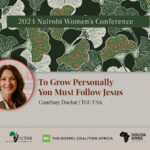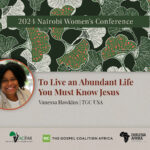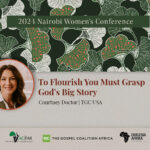TGC Africa hosted their first ever women’s conference in October 2024 at CORAT Africa in Nairobi, Kenya. TGC Africa Women are passionate about equipping and encouraging women to understand and read the Scriptures for themselves.
Courtney Doctor (Director of Women’s Initiatives, TGC Central) and Vanessa Hawkins (Fellow of The Keller Center) presented 3 engaging keynote sessions exploring The Big Story of Scripture: From Garden to Glory as well as deep dives into two of Jesus’ I AM Statements: I Am the Door and I Am the Good Shepherd.
Have you ever wondered what God is doing? Life is full of circumstances that cause us to question the plans and the purposes of God. But God hasn’t left us without direction. Whether you’re wondering or confused, frustrated or defeated, you aren’t alone; God isn’t silent. When we turn to scripture we learn about God’s covenant mission to restore us to himself and make all things new.
Scripture is the glorious story of God’s redemption, his works in our world, on our behalf.
Courtney Doctor reminds us that, “Scripture is not just a compilation of stand-alone truth statements or doctrine that we need to intellectually conquer, or a list of dos and don’ts. It is the glorious story of God’s redemption of his people, his works in our world, on our behalf. How did he do it? He did it by making and keeping and cutting covenant for us. Why did he do it? Because he loves us, because he wants to dwell with us.”
God’s covenant with us has as its anchor God’s promises and his faithfulness to bringing them to fruition. They reveal that God is relationally committed to his people. More than this, covenant theology reveals both that we are unable to keep the conditions or commandments and that God keeps them on our behalf. There is no more striking expression of this than the cross. For on it Christ suffers the covenant curse for disobedience while securing for us covenant blessings by his righteous obedience.
Since creation, God’s desire has been to dwell with his people.
So in this talk Courtney reminds us that, “Since creation, God’s desire has been to dwell with his people and he has always accomplished his purposes by coming to us, by initiating the relationship. And he does it again by sending his Son. Eventually, we’re going to see that he accomplishes it by sending his Spirit who will dwell in us.”
Though we might not always know what God is doing in the details, we can find great confidence in this bigger story, told through scripture.
Other Content on the Topic of Covenant
How To Read The Bible Correctly
How the Father, Son and Spirit Work to Make Us Children of God
Why Covenant Theology Matters
God Is Nearer and More Compassionate Than You Think
Date: Saturday, 12 October 2024
Location: TGC Africa Women’s Conference, CORAT Africa, Nairobi, Kenya
Transcript
Bible Overview
Ah, it’s finally here. We have been longing and looking forward to this day for so long. So I just want to start by saying; this is the day that the Lord has made, we will rejoice and be glad in it. I’ll tell you what; it is a joy and a privilege and an honour to be in this room with each one of you. I am, I am just blown away at what the Lord has done. My friend Vanessa and I just keep looking at each other and saying, “Who is like the Lord?” I can’t believe that he’s gathered us here to open his Word together today.
So it is only his doing and we are so eager to be with you all today. So thank you for – if this was a drive for you, if you had to come out this way – thank you for making the effort to be here.
What we’re going to do today is; I’m going to start by doing an – this is going to be so hard for me! Let me see if I can do a little bit of back and forth on this. I take it out… What we’re going to do today is start by doing an overview of the Bible story – the Biblical narrative.
Raise your hand if you joined Nancy Guthrie last year at EBC for her Biblical Theology workshop? So Biblical theology rests on, and resides in, the narrative of Scripture. And so we’re going to actually just tell the story of Scripture.
And one reason we’re going to do it, even if you know it through and through, and you know all the different parts of it, I never get tired of telling the story, because what it does, when I look at the cohesiveness of Scripture, when I look at the fact that it’s a story started in the garden, and it doesn’t end until the new heavens and the new Earth, and I see how God has woven all of this together – in fact, he identifies himself in Isaiah 46, he says, “I am God alone.” And the way we know he’s God alone, he says, “I’m the one who knows the end from the beginning.” (Isaiah 46:10)
So as the author of the story, as I study it, as I remember it, as I tell it, as I hear it, a few things happen in my own heart; and one is my love of God’s Word increases and my ability to trust God’s Word just grows.
But also my love of him – the author of the story, the one who wrote the whole thing – just grows. And my ability… and so here’s my hope for this morning: that your ability to not just love God but to trust him and to rest in him will grow as we tell the story, which might be for the hundredth time for you. But, I’m so glad that we are together.
So we’re going to break our time this morning into four questions. The first question is going to be: what is Christianity all about? The second: how does God work? The third: why does God work? And the fourth: how did he fix the problem? So, what is Christianity all about? How does God work? Why does God work? (Which is my favourite part.) And four, how did he fix the problem?
What Is Christianity All About?
So if I were to ask you what is Christianity all about? I want you to, not out loud but in your minds or even on paper, write down or think of the way you would begin to describe that question, the way you would answer that question to somebody who had never heard of Christianity before. And if you’ve been walking with the Lord for a while, you might at first blush think, “Oh, this is going to be an easy question to answer.” But it’s not, is it? It’s not the easiest question to answer. What is it all about?
Is Christianity about being a really good person or being a better version of yourself? Is it about being active in a church or raising moral children? Is it about a set of doctrine, you know, that we need to intellectually conquer? Or is it just sort of this me and Jesus thing that we’re going to do for the rest of our lives?
Well, in order to answer the question, what is Christianity all about, I think we need to back up and ask what is this? What is this? (Bible) Is this a set of doctrine to intellectually conquer? Is this a collection of short stories that give us moral examples of people to follow? Is this a list of rules – of dos and don’ts? You know, don’t do this, do do this.
It has elements of each of those, doesn’t it? It has some examples that we’re to emulate. It has some good and bad. Do this, don’t do that. It has a set of, it has sets of rules in it: don’t do this, do do this. But it’s so much more.
John Calvin, who is a French Theologian, said that the Bible ultimately is the story of God’s works in our world, on our behalf. Meaning from beginning to end, it is a narrative account, it is a story of what God is doing in the world for us. Which means that God is the main character, not us. The stage is going to be this earth, this whole globe – we just sang that, “this whole terrestrial ball.” So he is working in all the world.
And as the story progresses, what we learn is that what he’s doing is for us, it’s on our behalf. And so, the easiest way to say it is that it is the story of redemption from beginning to end. And, like any good story, this story has a structure to it. It has a plotline, it has characters, it develops.
We call it progressive revelation because we know more about God at the end of the story than we knew about him at the beginning of the story.
And so the first thing we’re going to do is talk through the structure of the story. And we don’t, we don’t talk about the structure of the story in order to just have more Bible knowledge or Bible trivia, we talk about the structure of the story because each part of the story is doing something and each part of the story reveals something about us and something about God.
So, I remember being in my high school English class and I learned that any good story has four main parts to it. Raise your hand if you remember this from your education. That there’s an introduction in any good story and in the introduction, you learn who the characters are and you learn what the setting is.
But then any good story is going to have a conflict, something that comes in and disrupts and something that has to be solved. And then any good story is going to have this high point or this climax where the problem that was introduced, the disruption, the conflict is fixed, it is solved. And then any good story is going to have a conclusion, which is what happens to the characters after the problem is fixed.
And so tell me if this translates: fairy tales. Any fairy tale has this structure. So every fairy tale is going to start off with, (do you know this?) “Once upon a time…” Is that, does that translate? Okay, so “Once upon a time.” What happens in a fairy tale, in “Once upon a time?” Well, the character is normally skipping along and the sun is shining and the birds are singing and everything is right in the world.
But then, in any good fairy tale, an evil witch or some evil comes in and disrupts. And when that happens in the story, then the main, not the main characters, but the characters in the story are then in danger and they’re wounded and they’re helpless and they need a rescue, don’t they?
And so, every good fairy tale has a hero and that hero comes in at just the right moment, just the right time and what does that hero do? Well, he saves the characters who were in danger and who were hurt and who were wounded and who were helpless.
And then, how does every good fairy tale end? Happily ever after. And when we see happily ever after, what we see is what happens to the characters after they are restored. And so a lot of times, we see it looks like the beginning: the sun is shining, the birds are singing and the characters are safe. The characters have been rescued.
Well, the Bible the truest story ever told. And so, fairy tales resonate with us deep in our souls because you know what, they are reflecting the beauty of the truest story that we have. They are reflecting the beauty of the story of Scripture. And so those four parts, we call them, we don’t call them, “Once upon a time, but then an evil witch, but then the hero, and happily ever after.” We call them creation, fall, redemption and new creation. And those are the four parts of the story.
And the reason it matters is because something is happening in each of those parts of the story. The structure of the story that reveals something about God and about us.
Herman Bavinck, a Dutch Theologian said, “The essence of the Christian religion consists in this: that (and I want you to hear all four parts in this) the creation of the Father, devastated by sin, is restored in the death of the Son of God and recreated by the Holy Spirit into the kingdom of God.”
The four parts of our story: creation, fall, redemption and new creation.
So, what do we learn about God and about us in the introduction of our story? We find it primarily in Genesis 1 and 2, that is where we are introduced to the main character, which is going to be God and not us. And what we see, we are told seven times in the creation account that it was, what? It was good, it was good, it was good, it was very good.
But we have to ask ourselves; what was so good about it? What was so good about Eden that God himself could declare seven times – the perfect number, number of completion, seven times – what was so good about it?
Well, it was good because God was present with his people. He was fully dwelling with them. They had perfect fellowship with their Father and perfect fellowship with each other and with their world. There was no sin and as a result, there was nothing that comes along with sin, that we’re going to see sadly when we turn the page. There was no sickness or suffering or death.
And so, the people of God were living in the presence of God, in the place that he had for them, fulfilling his purposes for them. It’s what the Bible refers to as the “Shalom of God” – this perfect peace, this perfect flourishing for his people. And it’s what you and I were created for.
And so, if we don’t understand the introduction, then we not only don’t understand what you and I, what our hearts long for. We also don’t understand why our hearts absolutely crumble and are crushed under the weight of the things that you and I were not created for.
We are not created for sin. We are not created for suffering, we are not created for death. And so, the introduction shows us that this is going to be a story about God but it is going to be for us.
And sadly we have to turn the page. It would be so great to just stay in Genesis 1 and 2, but we have to keep reading the story. And so we turn the page to Genesis 3, and Genesis 3 starts off very abruptly.
“Now the serpent was more crafty than any of the other beasts of the field…” (Genesis 3:1) And as a reader, we’re supposed to be like, “Wait a minute! What was a crafty serpent doing in God’s perfect place? This place that he had, where there was shalom for his creation.” So immediately we know that something is not right. And in the first seven verses of Genesis 3, we learn that something awful has happened, something that disrupts God’s good world. And we call it the fall.
I had a professor who said the fall sounds too passive. He likes to call it the rebellion and I like that. Where they rebelled against their good God and so much changed when that happened. Immediately, Adam and Eve become traitors to their good King and they become disobedient children to their good Father.
And as soon as they do, as soon as they disobey him and sin enters the world, sin is the thing that brings everything else with it. Romans tells us that “the wages of sin is death.” (Romans 3:23) And so it is sin that ushers in all of these things.
Now we see that the characters are wounded and they are helpless and they are in danger and they are going to need to be rescued.
Adam and Eve, we know, try to hide, they try to cover up their sin, but of course they can’t. And what we see after these first seven verses, God enters the scene. He didn’t have to. The story could have been: God made it, man broke it, the end.
But when God steps on the scene again and he comes to Adam and Eve. This is a story where it is always going to be God coming to his children. It is always going to be a story where God is the only one initiating. And so we see it here in the garden in Genesis 3, and he comes to Adam and Eve and he calls them out of hiding and he covers them.
And that is going to be something that is repeated over and over and over again. It is how God saves us. He calls us out of hiding and he covers us. And instead of them just being blasted off the face of the earth – which is what could have happened – God turns first to the Serpent and what he’s doing essentially in this: he’s calling Adam and Eve onto his side. It’s like he’s putting them behind him and saying, ‘Instead of doing battle with you, I’m going to do battle for you. I’m going to wage war on your behalf.” And so he speaks to the Serpent first.
And Genesis 3:15 is a verse that every believer needs to know because when God steps on the scene and he speaks to the Serpent, he says, “I’m going to put enmity between you and the woman.” The war is going to not be between me and Adam and Eve; the war is going to be between me and you. And I’m going to put enmity between you and the woman and between her offspring and your offspring. But her offspring, he, this single individual, this promised offspring, this promised child, this seed, this heir, it’s all the same, that this one person that I will send, is going to crush your head. “You will strike his heel but he will crush your head.” (Genesis 3:15)
And so God is giving Adam and Eve hope because he’s then going to turn to Adam and Eve and he’s going to offer them consequences for their sin, for their rebellion, for their disobedience. And we all know that we live under those consequences. But before he gave the consequences, he gave the promise of redemption from the consequences. Which means for you and for me, that the final answer, God’s final answer to sin – your sin and my sin – is not curse, it’s redemption. It’s redemption. Every single time.
So God’s promise is: “I am going to make it right again and I’m going to do it through one born of a woman.” And so, as we read the story and we turn the page, every time a child is born, we are meant to ask, “Is this him? Is this the one that’s been sent to crush the head of the Serpent?” And we read over and over and over again, is it him? No, it’s not him. It’s not Seth, it’s not Noah, it’s not Abraham, it’s not Moses, it’s not David, over and over again.
So the Old Testament is actually creating a longing in us for the day that the one will be sent. It’s making us to long for and to wait for and to watch for God’s promise to be fulfilled, because the entire story is being played out in light of Genesis 3:15.
You know in the Old Testament over and over again; the psalmist, the prophets, they cry out: “How long oh Lord. How long oh Lord.” And so the Old Testament is forming and preparing a people to receive the salvation that the Lord will accomplish.
How Does God Work?
So as we work our way through the story looking at what God is doing, what God is doing, we’re going to first ask, “How is he doing it?” How does God work? This is our second question. Mike Williams says that God’s way in all of this, in the story, in the historical drama, he says is the way of covenant. The triune God acts covenantally in history. And so one way to trace the story – you can trace themes through the story – but one beautiful way to trace the story is to trace the covenants, because the covenants are actually what push the story forward. They’re actually what move the story forward.
And so, when you hear the word “covenant”, what comes to mind? Think of a few words that come to mind when you hear the word “covenant”. A lot of us think things like promise or contract. We have the covenant of marriage and in the covenant of marriage, what do we pledge to the other one? Till death do us part. It’s a serious business to enter into covenant with someone else.
But here’s the problem; most of us have had someone else break a promise to us, even break a covenant with us or we have been the promise breakers. We have failed others around us. Because all of us are covenant breakers, all of us. We go through life simultaneously as sinners and those who have been sinned against. We are sufferers and we are those who cause the suffering of others.
And so all of this can really jade or alter our thoughts about what a promise from God is, what a covenant from God is, because we are by nature covenant breakers. We are by nature promise breakers.
But here’s the good news: our God is a covenant-making, covenant-keeping God.
Numbers 23:19 says, “God is not man, that he should lie,
Nor the son of man, that he should change his mind.
Does he speak and then not act?
Does he promise and then not fulfil?”
And the answer is no. If God has spoken it, it will come to pass. If God has promised it, he will fulfil it. And so we cannot allow human sin – ours and the sin of those around us – to diminish what it means for our God to act covenantally in the story of redemption. It should actually astound us that a holy, omniscient God, a creator God, would choose to bind himself to us through his word because he will not break his word.
And so he knew on the front end, he knew on the front end that we were covenant breakers, that we would fail him and yet he stepped into it, and we’ll see in his covenant with Abraham, that he promised he would actually keep both sides of the covenant.
So covenants were actually part of the Ancient Near East and in the world that the original, that the Old Testament was being written in. And in the covenants in the Ancient Near East what would happen is there was always a strong party (so think nation) and a weaker party (think nation). And the stronger party would say, “I will promise and I pledge to offer you provision and protection.” And the weaker party, the weaker nation, would then promise, “I offer you loyalty and obedience.”
And so they were coming together and they would have a covenantal ceremony in which – and most of you know this – they it’s the verb used to make a covenant is to “cut a covenant.” And the reason that is is because the way covenants were established or ratified is that they would take animals they would cut them in two, lay them open on each side and then both parties would pass through the broken and bloody and torn bodies of the animals.
And what they would pledge is, “If I break this covenant, if I fail to offer you protection and provision or if I fail to offer you loyalty and obedience, then may what happened to these animals happen to me.”
So God chose to cut covenant on our behalf. He chooses to work through his promises, through his pledges, to his people.
So I want to very quickly look at each covenant as we make our way to the most glorious one of all – the New Covenant. So go back to the garden and let’s look quickly at the covenant with Adam, the covenant with Adam.
What we need to realize there is that Adam and Eve had been given everything. They had absolutely everything that they needed. They had full provision. “You may eat of every tree of the garden, except one.” (Genesis 2:16-17) And it was, it was beautiful and it was lush and they had been given God’s great mission to fill the earth, to extend Eden until the whole earth was filled with his presence and with his glory.
And they had been given the dominion necessary to accomplish their purposes. They had been made in God’s image and then they had been told to go and bear that image in all the world. They had perfect relationship, we already said with God and with each other. And so they had all, they had everything they needed for life and for joy and for abundance. And they had one provision, one provision: just don’t eat from the Tree of the Knowledge of Good and Evil.
And it’s important to stop and notice that in the covenant with Adam, their obedience did not secure God’s blessing – they already had it. It was grace. God had already given it to them. But what they did stand was to lose everything by disobedience, which we know they did.
So we’ve already looked at Genesis 3:15, that God is going to promise and provide victory and he is going to do it through the seed of a woman. He is going to undo what Adam and Eve just did and that will be through Jesus. And so in that promise, we learn that God is going to restore, he is going to restore and redeem. He is going to be victorious.
As we turn the pages again and we jump ahead, the next covenant that we come across is the covenant with Noah. And the covenant with Noah, God simply re-establishes his creation covenant with Adam. He is giving humankind, human beings, purpose and mission.
And then the third covenant is the covenant with Abram. And the covenant with Abraham because he makes before he changes his name in Genesis 12, he begins the covenant with Abram. And what he does is he called one man, one man to come and follow him. And he promises him, he says, “I’m going to give you land and I am going to give you descendants or offspring, (we see that word again) I’m going to give you offspring as numerous as the stars in the sky.” And then in Genesis 12 he says, “and through you, Abraham, through you I am going to bless all the peoples of the earth.” (Genesis 12:1-3)
So even though he is calling one man to come and follow him, his sights are still set on the whole earth. Genesis 12:2 he says, “I will bless you and I will make your name great – not for you Abram – but so that you will be a blessing. I will bless those who bless you and him who dishonours you, I will curse. And in you, all the families of the earth shall be blessed.”
So even though the focus has narrowed to one man, God’s sights are still set on the whole earth and he’s still promising an offspring, isn’t he?
So now we know that the seed that was promised to Adam and Eve is still coming. This victory that was promised is still going to happen, and now there’s going to be blessing, blessing for all the peoples of the earth.
Well, Abraham starts off with just one child, Isaac. Isaac has Jacob. Jacob has Joseph. Joseph ends up in Egypt because of the famine, calls his whole family. So now it’s gone from Abraham, one man, to a family group of about 75 people. They end up in Egypt and over the course of 400 years they multiply greatly. They grow into a great multitude. In fact, Scripture tells us that they are now a people as numerous as the stars in the sky.
The Egyptians, after 400 years end up – it’s the book of Exodus – they are enslaved. And God has never meant for his people to be in slavery, to remain in slavery, so he goes into Egypt and with great signs and wonders he rescues them. And he pulls them out of Egypt and they cross the Red Sea.
And the very first thing that God does after he rescues this group of people – he calls them to himself, he calls them to himself at the base of Mount Sinai and he establishes them there as the nation of Israel. And he enters into covenant again with the nation of Israel through Moses.
So it is no longer a covenant with just one man or one family but now it is with an entire nation.
And in Exodus 19, he says through Moses, he said, “You yourselves have seen what I did to the Egyptians and how I bore you on eagle’s wings and carried you to myself.” (Exodus 19:4)
Meaning, you didn’t do anything. I did it all. Salvation always belongs to the Lord. He says, “Now therefore if you will indeed obey my voice and keep my covenant….”
So he’s establishing covenant and he is requiring covenantal loyalty from them. “…if you will obey me, if you will be loyal to me, you shall be my treasured possessions among all the peoples of the earth, for all the earth is mine.” (Exodus 19:5)
God’s sights have always been set on the whole world. He says, “You shall be to me a kingdom of priests and a holy nation.” (Exodus 19:6)
And so the covenant that God enters into with Israel includes the law. And a lot of times we don’t know what to do with the law, but the law was saying, “If you’re going to be a holy nation, you’re going to be a kingdom of priests, if you are my treasured possessions, my children, this is how you’re going to act like it. I’m going to show you how to bear my image. This is how you’re going to carry out the mission. This is how as my covenantal children, you’re going to act like covenantal children.”
And so through this, we know that God is still sending a seed. That seed is going to come through Abraham, through Israel. We’ve learned now, because the story is progressive, that God is a deliverer, he’s a rescuer, he’s a redeemer. He is a God who pulls his people out of slavery and into relationship, to treasure his people and to give them a mission and a purpose. He still wants his people to be a blessing to the world and he now has given a standard for how we’re to do that, how to bear his image by obeying him, being faithful covenantal partners.
So fast forward in the story again and the people wander and they eventually make it into the Promised Land. And we have the book of Joshua and the book of Judges. And they settle into the land and they want a king. They want a king and so they choose Saul as their first king and that didn’t go so well. And so God said, “Let me give you David.” And with David, God enters into the fifth Covenant that we find in the Old Testament.
2 Samuel 7, “The Lord declares to you that the Lord himself will establish a house for you. When your days are over and you rest with your fathers, I will raise up your offspring, your child, to succeed you, one who will come from your own body. And I will establish his kingdom. He is the one who will build a house for my name.” (2 Samuel 7:12)
And at this point, as we’re reading 2 Samuel 7, we should think, “Oh, that must be Solomon! A child from his own body, the one who’s going to build the house for his name.”
But then God says something in this covenantal promise and we know there is no way it can be Solomon because this is what God says next. “And I will establish the throne of his kingdom forever.” (2 Samuel 7:13)
So God is still promising an offspring, but now he is promising an eternal throne and an everlasting Kingdom. So the promised seed from Genesis 3:15, it’s still, he’s still going to come through Adam, through Abraham, through David. He’s still going to crush the head of the enemy, Genesis 3:15. All the peoples of the earth will still be blessed by him, Genesis 12. He will perfectly keep the law, Exodus 20. And now we learn that his kingdom and his throne will endure forever, that he will be such a king that he will sit on an eternal throne.
And so, those are the expectations, those are the hopes and everything is pointing and preparing and creating longing in us to see this person arrive, because who can fulfil such expectations?
Why Does God Work?
But before we get there, I want to answer the third question: why? Why would God bind himself? Why is God working to redeem all things? Why did God set out on the greatest rescue mission of all time, because, if anything else, if you don’t hear anything else today, I want you to hear this because what it does for me is it anchors my heart so deep in the heart of my Father, that I rest in a way that I have never known rest before.
And there is a theme that runs throughout the entire story. It runs underneath the thread of covenant, it runs underneath all the themes that we can trace, it is just this thread. If covenant is how God is working, this is why God is working. And it is captured in the phrase, and anytime you see it in your Bible underline it, mark it, note where it is. It is the phrase “I will be your God and you will be my people and I will dwell with you.”
God created us to be in this relationship with him – this safe, secure, kind, loving, merciful relationship with him. And it was lost in the garden but it doesn’t mean that God changed his mind. God’s purposes stand forever. And I don’t know why but for some reason, God longs for us to be with him again, longs for us to dwell with him. And so, the entire story is a story about how God is making things right again so that he can dwell with us.
That’s why he is on this rescue mission. He repeats it over and over and over again. He started in Genesis 17:7 with Abraham. He says it again to Moses in Exodus. He says it again to the people of Israel in Leviticus. He said, “I will put my dwelling place among you and I will not abhor you. I will walk among you and be your God and you will be my people.” (Leviticus 26:11)
He says it in Deuteronomy. He says it in Jeremiah 24. Jeremiah 31, he says. “The time is coming, declares the Lord, when I will make a new covenant with the house of Israel and with the house of Judah. I will put my law in their minds and write it on their hearts. I will be their God and they will be my people.” (Jeremiah 31:31&33)
He says it again in Jeremiah 32. He says it again again in Ezekiel 36, where he promises the new heart. He’s going to remove our heart of stone and give us a heart of flesh. (Ezekiel 36:26) And do you know what he’s going to do when he does that? It says that he will, “cause us to follow his decrees and be careful to keep his laws.” (Ezekiel 36:27)
Do you know what he’s saying? He says, ‘I’m going to so change you that I will make you a faithful covenantal partner. I will make you able to obey me. I will make you able to follow me.” And we need his Spirit. He says, “I will put my Spirit in you.” He’s promising that the day is coming.
And so, after the Jews are sent into exile, they are brought back and there is 400 years of silence from God, 400 years with no word from the Lord.
But the silence is broken with this announcement, “…and they shall call his name Emmanuel – which means, God with us, God with us.” (Matthew 1:23)
How Does He Fix The Problem?
Do you remember the promise in Leviticus 26? “I will walk among you. I will put my dwelling place among you. I will be your God and you will be my people.” (Leviticus 26:11) And John’s gospel starts off by saying, “The Word became flesh and made his dwelling among us.” (John 1:1)
And so, since creation, God’s desire has been to dwell with his people and he has always accomplished his purposes by coming to us, by initiating the relationship. And he does it again by sending his Son. Eventually, we’re going to see that he accomplishes it by sending his Spirit who will dwell in us.
But all of history has revolved exactly as God has planned. He has perfect agreement between his promises, his plans and the fulfilment of those. And so, when Jesus arrived on the scene, when Jesus was sent by the Father, we know that the seed that was promised to Adam and Eve arrived; he is a descendant. Scripture goes out of its way to let us know: a descendant of Adam, descendant of Abraham, descendant of David, born to be a blessing to all people.
And what God does is he fulfils all of his promises, he solves the problem, he fixes the dilemma in this great high point, this great climax of the story, by cutting a new covenant. And in the same way that when he cut covenant with Abraham and he took the animals and he split them in two, in the same way he enters into new covenant with us.
Matthew 27:50 and 51 says, “And when Jesus had cried out again in a loud voice, he gave up his spirit. At that moment the curtain of the temple was torn into two from top to bottom.”
But when we get to Hebrews 10, Hebrews 10 says, “Therefore brothers, since we have confidence to enter the Most Holy Place, (which is what the temple curtain being torn represented) we have confidence to enter the Most Holy Place by the blood of Jesus, by a new and living way opened for us through the curtain…” But then, the writer of Hebrews adds, “…that is his body, that is his body.” (Hebrews 10:19-20)
That is the covenant that you and I passed through. The Son of God sent so that his body could be torn and placed and we get to pass through. God kept both sides of the covenant. We simply by belief, that’s what faith is, that’s what salvation is, we simply believe and say, “This is the only access to the Father.” No one comes to the Father except through the Son. We pass through the broken and torn body of Christ.
But the good news, friends, not only – it just keeps getting better – because it’s actually not the end of the story. So Jesus was sent to fulfil and to accomplish all of the Father’s promises, every single one, and the way he did it, scholars have said, was both more gruesome and more glorious than anybody could have imagined.
The Conclusion Of Our Story
But it’s not the end of the story. Remember, there is something else that we’re all looking forward to. What is the glorious conclusion of our story? Revelation 21 says John was able to see this vision: “Then I saw a new heaven and a new earth for the first heaven and the first earth had passed away and there was no longer any sea. And I saw the holy city, the New Jerusalem, coming down out of heaven from God, prepared as a bride beautifully dressed for her husband. And I heard a loud voice from the throne…” (Revelation 21:1-3)
And I love that John said it was a loud voice. It’s almost like the Father can’t wait any longer. And the first word out of his mouth is “now.”
Do you remember in Jeremiah and Ezekiel when he said the time is coming, the time is coming? Well, there will be a day when God says “now” and it will be an actual day in history. And what does God say? “Now the dwelling of God is with men and he will live with them. They will be him, his people, and God himself will be with them and be their God.” (Revelation 21:3)
It is the accomplishment of his greatest desire, is that he will dwell with us and we will be his people. And when he does that, we see all of the ramifications of sin completely wiped away. He says, “He will wipe every tear from their eyes and there will be no more death or mourning or crying or pain for the old order of things has passed away.” (Revelation 21:4)
It will be gone. All of the things that sin ushered in are only with us for the middle two parts of the story. They weren’t in the beginning, and friends, they will not be there at the end. And so, God, since before time began, has desired to be in relationship with us, to be our God and for us to be his people and to dwell with him.
But the Holy One cannot dwell in the midst of the unholy and the Righteous One cannot dwell in the midst of the unrighteous, and so, he had a plan to actually make us righteous by giving us – through the death, through the life and death and resurrection of his Son – the perfect righteousness of Christ.
For 2 Corinthians 1:20 says, “For no matter how many promises God has made, they are yes in Christ.” The promise of a seed – yes. The perfect fulfilment of the law – yes. The promise of a throne – yes. The perfect fulfilment of all – yes.
God has done everything that he said he would do and he is making all things right again. That is the glorious end, the glorious conclusion to this drama of redemption. And he is rescuing us and he is restoring us so that we can dwell with him again.
And so Scripture is not just a compilation of stand-alone truth statements or doctrine that we need to intellectually conquer, or a list of dos and don’ts. It is the glorious story of God’s redemption of his people, his works in our world, on our behalf. How did he do it? He did it by making and keeping and cutting covenant for us. Why did he do it? Because he loves us, because he wants to dwell with us.
God Is For You
And so, here’s what I want to leave you with this morning: if you have trusted that this God is the covenant-making, covenant-keeping God, that he has fulfilled all of his promises in the death and resurrection of his Son, then what you need to know and what I desperately need to know deep in my heart is that God is so for you. He is for you. He has cut covenant using the body of his one and only Son so that you would not be cut off, so that you would belong to him.
And so for us to be women who live in light of the story of redemption, to know the story of redemption, to believe the story of redemption, to cling to the story of redemption, it means that you rest and you know deep in your soul that you serve a God who will never leave you, who will never forsake you, because he has redeemed you. He loves you and he is going to see you and me all the way home.
Let’s pray. Almighty God, we bow before you and we simply say thank you. Who is like you? There is none like you. You are worthy to be praised. You are exactly what we sang, holy holy holy, worthy to be crowned with many crowns. We hail the power of Jesus’ name. We love you, Lord. Help us to love you more. Help us to be women who know and love and believe your Word. Help us rest deeply in it, knowing that you will never leave us or forsake us. Pray it all in Jesus’ name, amen.
Courtney Doctor (MDiv, Covenant Theological Seminary) serves as director of women’s initiatives for The Gospel Coalition. She’s a Bible teacher and author of From Garden to Glory: How Understanding God’s Story Changes Yours as well as several Bible studies including In View of God’s Mercies and Behold and Believe. Courtney and her husband, Craig, have four children, three children-in-law, and five beautiful grandchildren. You can follow her on Instagram or find out more at courtneydoctor.org.














